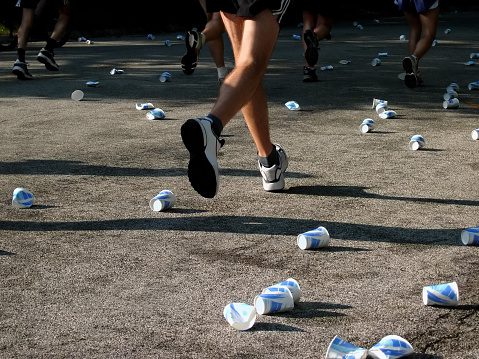British race threatens litterbugs with disqualification
Races are taking their responsibility to the environment more and more seriously

Many popular road races are making an effort to cut down on the litter these events produce, with some following the lead of the more progressive trail races that have gone cupless, among other measures. Some races, including the the Conwy Half-Marathon in Wales, warned runners ahead of last Sunday’s race that they faced disqualification if they dropped litter on the course outside of water stations (even if it involved cups supplied by the race).
RELATED: Scotiabank Toronto Waterfront Marathon recognized as environmentally responsible
“Runners will now be disqualified and taken off the results if seen discarding their rubbish outside of a water stop or not with a marshal,” according to the race site. The threats must be working, because so far we’re not aware of anyone actually being DQ’d for this reason.
BBC News – Plastic waste: Runners face littering disqualification https://t.co/AwszLN6JhE #runr #ukrunchat ?
— runr (@runr_uk) November 17, 2019
Races like the Road2Hope Marathon in Hamilton have adopted similar policies, warning runners to discard cups, bottles and clothing at water stations only or risk being DQ’d. “We hope that this entices people just enough to pick up after themselves,” says Michelle Greenspoon Pauls, Road2Hope race administrator. “The city gets quite upset with us if we leave garbage on the course, so we need to be diligent in cleaning it so that they allow us to continue to use the roads year over year. We hope that our participants recognize this and be respectful.
We found similar litter warnings at the Eugene Curnow Trail Marathon in Minnesota, whose rules state that “littering along the trail will be cause for disqualification.” At the 2018 HK100 in Hong Kong, winner and course-record-setter Liang Jing was DQ’d for taking a water bottle from a passing hiker–and then dropping it on the course. But though the media criticized plastic litter after the 2018 Grand Brighton Half-Marathon in the UK, there is still nothing in that race’s rules about avoiding litter.
RELATED: London Marathon to offer edible water bottles on course
The London Marathon has been a pioneer in the effort to reduce its environmental impact, and specifically to reduce waste at marathons–but so far we have not seen threats of disqualification for littering.
With 47,000 plastic water bottles lying on the streets of London after the 2018 race, it really needed some radical new ideas. Some examples: providing water in bottles made from recycled plastic, reducing the number of hydration stations on the course, introducing drop zones for plastic water bottles, delivering discarded plastic bottles directly to a recycling plant, using compostable cups, providing biodegradable or edible water pouches made of seaweed, and providing re-usable water belts. Similar efforts were targeted at spectators this year.
RELATED: How green is your trail race?


